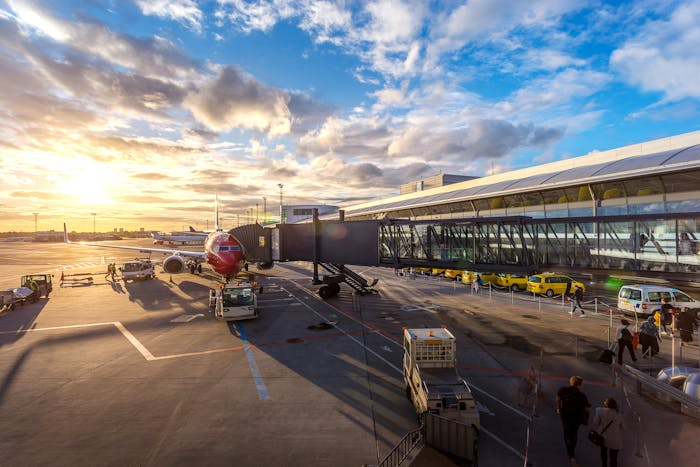Airbnb Service Fee: Your A-Z Guide

Maintaining a successful Airbnb rental sometimes requires a juggling act to keep track of the finer details — like the Airbnb service fee. All expenses, fees, and taxes incurred in the running of your Airbnb, including the Airbnb service fee, impact your business’s profitability and return on investment.
Because of this, it’s important to understand the inner workings of all fees and expenses. This will ensure that you are not blindsided by hidden Airbnb fees and that your business remains profitable.
Below is a full breakdown of everything you need to know about your Airbnb service fee.

What Are Airbnb Service Fees?
An Airbnb service fee is a fee charged to hosts and/or guests by Airbnb in exchange for the marketing, administration, and 24/7 customer support services the platform provides.
This fee is charged as a percentage of the subtotal value of each booking made. It applies automatically so that hosts and travelers do not have to worry about paying it separately. Hosts will see this fee deducted from their host payout in their transaction history on Airbnb, while guests will see it applied at checkout when completing their reservation.
How Much Is the Airbnb Service Fee?
Airbnb features two different service fee structures: the split fee and the host-only fee. Here are the key differences between the two:
1. The Split-fee
As the name suggests, the split fee shares the Airbnb service fee between both the host and the guest, with the guest absorbing the majority of the fees.
This fee structure has its upsides in that hosts can seemingly set a lower nightly rate when they don’t have to pay as high a fee. However, the major downside is that travelers can feel scammed when this large extra fee only pops up at checkout.
What hosts and guests pay
Under the split-fee model, hosts are charged around 3% of the subtotal of the reservation, excluding taxes. However, Airbnb could charge a higher fee for Airbnb Plus hosts, hosts with listings in Italy, and hosts who opt for the Super Strict cancellation policy.
Guests will pay the majority of the service fees. The guest fee usually amounts to around 14.2% of the subtotal of their reservations, on average.

2. The Host-only Fee
This fee structure makes the host responsible for covering the service fee. Although this may seem like a less favorable option for hosts, it ends up allowing you more control over your nightly rates. Moreover, it keeps travelers happier without being bombarded by an unexpected guest service fee at checkout.
This fee is mandatory for hotels and software-connected hosts unless most of those hosts’ listings are located in the United States, Canada, the Bahamas, Mexico, Argentina, Taiwan, or Uruguay.
What hosts and guests pay
The host pays between 14-16% of the subtotal of the reservation.
Guests won’t pay a service fee, but hosts may choose to raise their nightly rate to indirectly transfer some or all of the service fee to the guest.
3. Airbnb Experiences service fee
For hosts offering Airbnb Experiences, like cooking classes or tours, a service fee of 20% of the price of the experience applies. Airbnb withholds this fee from the host’s payout as well. This service fee is occasionally waived for certain social impact experiences.

Do Hosts Have to Cover the Airbnb Service Fee?
Airbnb fees are inevitable for hosts that choose to make use of the platform and its services. But the actual amount you need to cover will vary depending on the fee structure mandatory in your location and how much of the fee you decide to transfer to your guest.
There are also methods to avoid or minimize the impact of the Airbnb service fee on your bottom line, which we will discuss a little later. But first, it’s important to understand why the Airbnb host-only service fee may be a smart option for your listing.
What Are the Pros of Using the Airbnb Host-Only Fee?
The underlying advantage of the host-only fee is that it gives you more control over your operations. The result of this leads to the following benefits:
1. Guests could pay less, while your revenue will stay the same
Because hosts can expect the entire service fee to be deducted from the host payout, they will be able to better control their nightly prices.
If you stick to a sound pricing strategy, travelers could pay less under the host-only fee while your own revenue will remain the same.
For example, if you charged $100 per night under the split fee, your guest would pay the $1000 + $142 guest service fee if they book a 10-night stay, totaling $1142. As the host, you will be charged a $30 service fee, leaving you with $970 to take home in revenue.
Meanwhile, under the host-only fee, you could raise your nightly rate up to $113 to account for the Airbnb fees you already know to expect. For the same ten-night stay, travelers will pay a total of $1130 with no additional service fee, slightly less than the split fee. At a service fee charge of 14%, Airbnb will deduct about $158 from your payout, leaving you with a take-home revenue amount of $972.

2. Guests are not blindsided by hidden service fees at checkout
Because Airbnb will only deduct the fee from the host payout, travelers will not feel scammed or blindsided by the extra service fees added onto their subtotal at checkout.
It makes for a better experience if travelers are charged the price they expect while you, as the host, account for the service fee in the background.
3. Improve your rankings in the Airbnb search results
Airbnb increases the visibility of listings that adopt strategies that improve the guest experience.
The host-only fee improves the guest experience by making the booking process more straightforward and transparent. As a result, Airbnb will reward these listings by granting them higher positions in the search results.

How to Boost Your ROI Despite Airbnb Service Fees
Even though you will incur a service fee while running your business, it is still possible to maximize your ROI.
Below are proven methods to ensure your Airbnb remains profitable despite incurring Airbnb service fees.
1. Optimize your pricing
To tip the scales against your expenses, the best strategy is to make sure that your prices are optimized, and your listing is bringing in all the revenue it can.
When calculating your nightly rates, make sure you factor in a service fee, along with your other major expenses, while still ensuring that your prices remain competitive. Sometimes this balancing act can get tricky. Luckily, there are tools that can help set your nightly rates for you.
Dynamic pricing tools are a smart way to take the guesswork out of setting the prices for your short-term rental. These tools can use real-time data, market trends, and fluctuations to set your prices automatically and provide you with the insights you need to stay ahead of the competition.
Some of the industry-leading tools include DPGO, Wheelhouse, and PriceLabs. Each of them uses world-class algorithms or AI-based technology to analyze demand and supply fluctuations, local events, seasonality, and other price-influencing data points to make setting your prices quicker and more effective.
While smart pricing tools may come at an extra cost, it’s well worth the investment if it means maximizing your revenue.

2. Optimize your occupancy rate
The more bookings you attract, the higher your revenue will be. Therefore, if you can maximize your occupancy rates, along with keeping your prices competitive, this would more than make up for the fee expenses.
In the same vein, if your occupancy rates are low, every booking will be that much more valuable, and letting exorbitant service fees eat at your profits will not be good for your ROI.
Some of the best ways to optimize your occupancy rate are to:
- Ensure your listing has up-to-date information
- Perfect your marketing strategy
- Encourage positive reviews
- Reply to your customer queries promptly
- Use Airbnb’s Instant Book feature.

3. Take advantage of vacation rental software
Handy tools like channel managers and integration software can help streamline operations, avoid double bookings, and save significant costs.
iGMS offers a robust set of tools that can help put your business on autopilot. As an Airbnb Preferred Software Partner, iGMS can seamlessly integrate with Airbnb and a host of other leading platforms to make your vacation rental management that much easier.
4. Change your cancellation policy
Airbnb’s service fees vary with their stricter cancellation policies. Hosts who adopt super strict cancellation policies pay up to 2% extra in service fees because of the extra administrative tasks and customer support that the policy will need.
If you would rather have lower a service fee structure, consider switching to one of Airbnb’s other cancellation policies.

5. Introduce a cleaning fee for your listing
Airbnb allows hosts to charge a separate cleaning fee as part of the guest’s reservation total. A cleaning fee can help cover the cost of keeping your property pristine and ready for your next guest’s stay. This means that you won’t need to use your revenue to cover these expenses, leaving more profits untouched at the end of the day.
However, it’s important to note that this will increase travelers’ booking total. Be sure not to charge too much that your prices are no longer competitive, and travelers are incentivized to book elsewhere. Try to keep the amount you charge close to the average cleaning fee of $65 per booking.
6. Offer additional services to guests
Offering additional services to travelers is a great way to earn extra revenue on each booking. Additional services could be anything that helps to make your guest’s stay more enjoyable.
For example, you could offer daily housekeeping, spa treatments, or hair and beauty services for an extra fee. You could also offer catered meals or guided tours and hikes in the area.

How to Avoid Airbnb Service Fees
If you rely on Airbnb’s platform and services for your vacation rental business, incurring the service fees is unavoidable. However, it is possible to be less reliant on Airbnb and avoid the host service fee as a result. Some ways to do this is to:
Encourage direct bookings
If you already have your own website for your rental property or are willing to put in the time and effort to build one, it may be worthwhile promoting direct bookings among your regular customers. This would enable you to bypass the Airbnb service fee.
However, it’s important to note that this also means you will forgo Airbnb’s customer support and administrative services, meaning that this will fall under your responsibility instead.
Use competing platforms with lower fees
Another way to avoid Airbnb’s service fee altogether is to search for a competing platform to feature your listing. Many alternative platforms like Vrbo or Tripadvisor offer lower service fees that may better suit your budget.
However, it’s essential to keep in mind that Airbnb’s platform is a market leader. It boasts large numbers of listings and web traffic. It also gives you access to an audience consisting of a wide range of different travelers — something your listing may not be able to benefit from if you decide to leave the thriving platform entirely. Be sure to think through the pros and cons of this decision before making this move.
About the Author
Callan Riddles is the Content and Social Media Specialist at iGMS. Callan has a passion for finding new ways to help vacation rental businesses thrive. In her free time, she loves to travel, read, and experience all the new things that life has to offer.






![Your Monthly iGMS Roundup [February 2020]](/content/images/size/w600/wordpress/2020/02/igms-roundup-feb-2020-cover.png)

